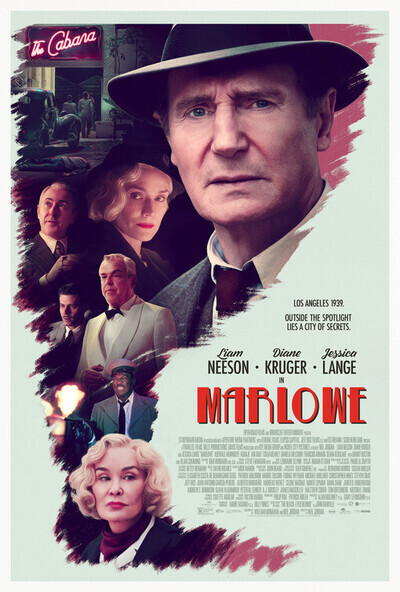
15 Feb Marlowe Review
MARLOWE
dir. Neil Jordan, starring Liam Neeson, Diane Kruger, Jessica Lange, and Adewale Akinnouoye-Agbaje
Set in the 1930s during the rise of the Hollywood studio system, Phillip Marlowe, a private investigator, is hired to find Nico Peterson, the ex lover of Claire Cavendish, the daughter of a former Hollywood icon. As Marlowe digs deeper into the case, he unravels more threads that lead to a bigger organization operating under the noses of everyone in Tinseltown.
Marlowe could’ve been a great movie. Long gone are the conventional, time-honored noir films that dominated the 1940s and 50s. A genre populated with cynical, down-on-their-luck rumpled detectives, beautiful but deadly women, double and triple crosses, and a case far further reaching than the detective initially conceived of, the noir made use of all these elements to create mysteries and whodunits that have stood the test of time. All of that is present here in Marlowe and yet somehow almost none of it works. Adapted from the 2014 novel The Black-Eyed Blonde, Marlowe took all the best bits of the genre and found a way to ensure that little of it made sense. Claire Cavendish is stunningly beautiful. Marlowe looks tired and untrustworthy of almost everyone throughout. Cigarette smoke hangs in the air just right, playing across the character’s faces. It’s all there and none of it is worth anything because the story itself doesn’t make a lick of sense. A film that blows past convoluted and catapults into absurd, both the plot and the screenplay feel like a high schooler read a few Raymond Chandler novels, recognized what made them cool, and regurgitated it into their own thing, forgetting that all these pieces only work when paired up with a genuine mystery that will keep audiences engaged and guessing. Marlowe unfortunately doesn’t and with its sometimes cringeworthy lines mixed with story beats that feel like darts thrown at a board, the real mystery is how this script got greenlit in the first place.
Thankfully starring Liam Neeson in something other than a washed-out action role, Marlowe sees the veteran actor in a noir setting for the first time. Surprisingly, Neeson is good in the role of Phillip Marlowe, portraying an aging private investigator attempting (and failing) to stay a step ahead of as many people as possible. Neeson’s world weary countenance conveys the look of a man who’s tired of dealing with the nonsense he encounters on a daily basis. While his scenes with Diane Kruger are excellent at capturing the tones of a traditional noir, it’s his scenes with Jessica Lange that stand out. For his part, Neeson does his best to carry the anemic story and were he to return to the role with a stronger writer, another chance would be merited.
Diane Kruger as Claire Cavendish fills the second necessary component of a classic noir story: the femme fatale. Kruger is great in the role as both the character who kicks off the events of the story and as the character you don’t know if you can fully trust. Kruger plays to that strength, as both timid and helpless at times while confidently holding all the cards at others. Radiantly beautiful, she’s a modern model for the fatale trope, and thanks in large part to the costuming department, Kruger wears her role well.
Jessica Lange is having a ball in this film. Regardless of the hokey lines or clunky exposition scenes, Lange is there to remind audiences she hasn’t gone anywhere and still has plenty of gas left in the tank. Her screen time with Neeson is delightful, delivering her lines with the most cheeky and mischievous of manners with many a wink and nod and twinkle in the eye. While appearing infrequently throughout the movie, she’s a joy every time she’s on screen, whether its supplying Marlowe with information or fanning the flames of confusion. Either way, Lange’s Dorothy Cavendish is the film’s MVP.
Neil Jordan did the best he could with Marlowe. The man who directed classics such as The Crying Game and Interview with the Vampire (back to back bangers) retains his eye for style and flair as he and cinematographer Xavi Giménez attempt different ways to retain the audience’s confusion. At 109 minutes, the movie is paced wonderfully, with answers that only reveal more questions sprinkled throughout the course of the story. As nonsensical, anticlimactic, or just downright absurd as those answers may be falls to screenwriter William Monahan. Responsible for the screenplay behind the hallowed Kingdom of Heaven and the Scorsese classic The Departed, every decision Monahan takes in the plotting of Marlowe is truly baffling. It’s surprising that with as much literature is discussed or referenced in the film (Alice in Wonderland, Elements of Style, references to writer James Joyce), the literature of the script falls so short of the mark.
Overall, Marlowe will be a film that’s easily forgotten by the beginning of March. A convoluted story, presented to the audience in such a confoundingly bad manner, is only minimally saved by Neil Jordan’s direction and the production design. Neeson, Kruger, and Lange do the best they can with the milquetoast screenplay, but thanks in large part to William Monahan what could’ve been a sumptuous feast of a story ends up being little more than cold broth. A poor excuse for a neo noir, most of the usual trappings are present without a framework to make effective use of them. Marlowe is currently in theaters.
Review by Darryl Mansel


No Comments